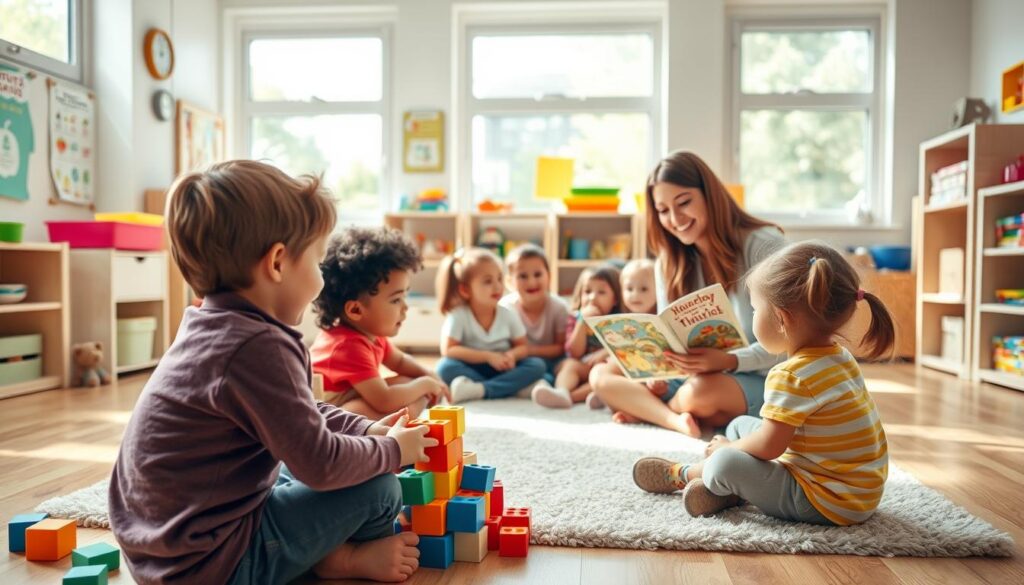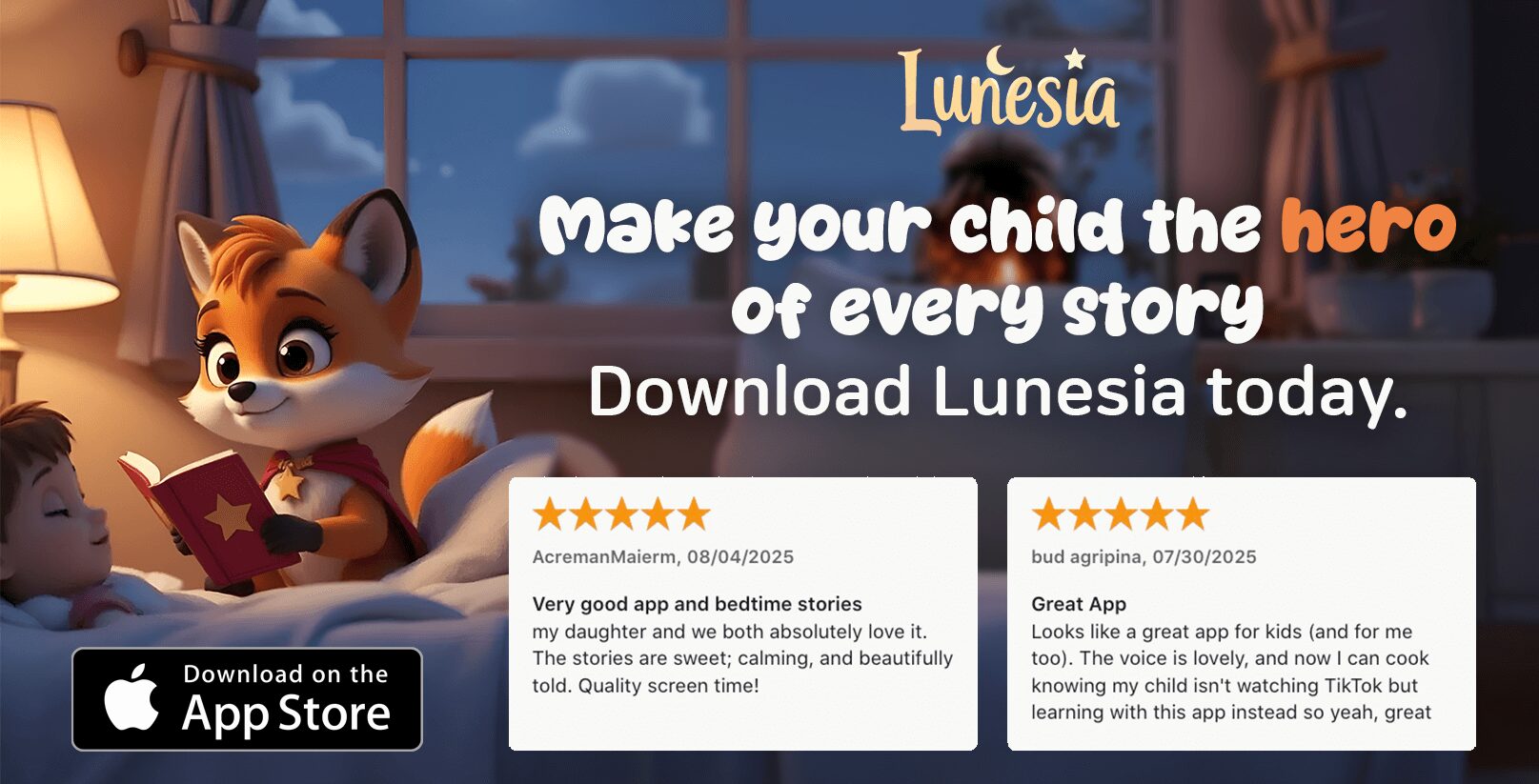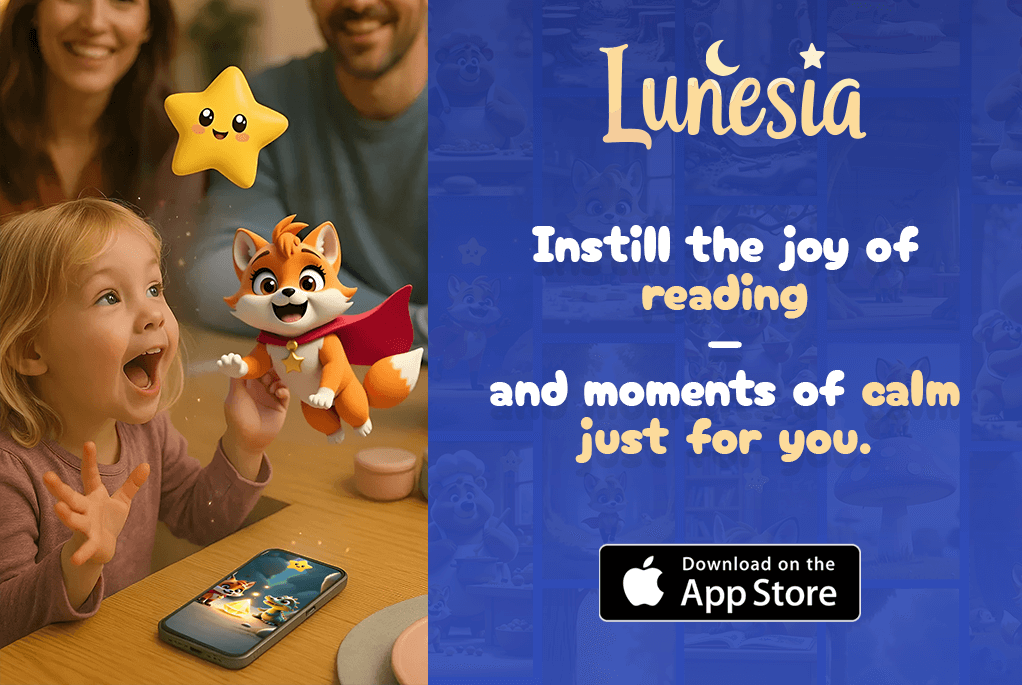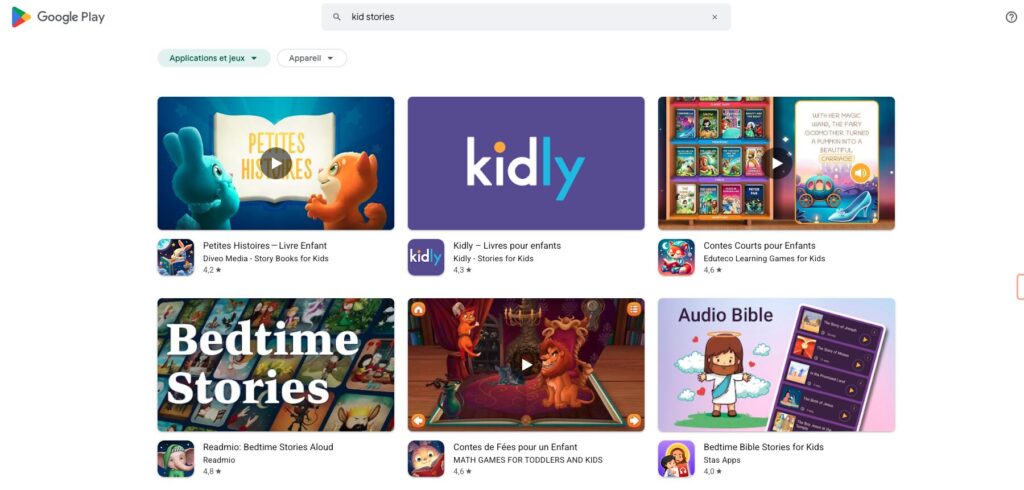As a parent, have you ever wondered how you can help your child navigate the complex world of emotions and interactions? According to research, the early years of childhood are crucial for development of social and emotional skills.
During the preschool years, children rapidly acquire foundational skills that impact their future academic success and personal relationships. Many parents struggle to find effective ways to support their child’s emotional intelligence and social competence.
Lunesia offers an innovative solution to help preschoolers build essential life skills through engaging activities. In this guide, we’ll explore how Lunesia’s approach supports the social emotional growth of your child.
Understanding Social-Emotional Development in Preschoolers
The preschool years are a critical time for children to develop essential social-emotional skills. During this period, they begin to understand and manage their emotions, develop empathy for others, and build foundational relationships. As a parent, understanding your child’s social-emotional development is vital for supporting their growth.
What Are Social-Emotional Skills?
Social-emotional skills refer to a child’s ability to recognize and understand emotions in themselves and others, and to use this awareness to guide thought and behavior. These skills are crucial for developing healthy relationships, achieving academic success, and maintaining emotional well-being. By understanding and managing their emotions, children can better navigate social situations and build strong relationships with their peers.
Why These Skills Matter for Preschoolers
Developing social-emotional skills during the preschool years is essential for a child’s future success. These skills lay the groundwork for positive relationships, academic achievement, and emotional intelligence. For instance, a child who can identify and manage their emotions is better equipped to handle the challenges of school and social interactions. You can learn more about how we support this development by reviewing our privacy policy.
Common Developmental Milestones
Children develop at their own pace, but there are certain developmental milestones that most preschoolers achieve around the same age. For example, by age 3, most children can identify basic emotions like happy, sad, and angry. Between ages 3-4, they begin to engage in cooperative play and share toys. Around age 4, they develop more complex emotional recognition, identifying feelings like frustrated or surprised. By age 5, most children can follow multi-step social rules and show empathy towards others. Understanding these milestones can help you support your child’s social-emotional development.
How Lunesia Helps Develop Social-Emotional Skills
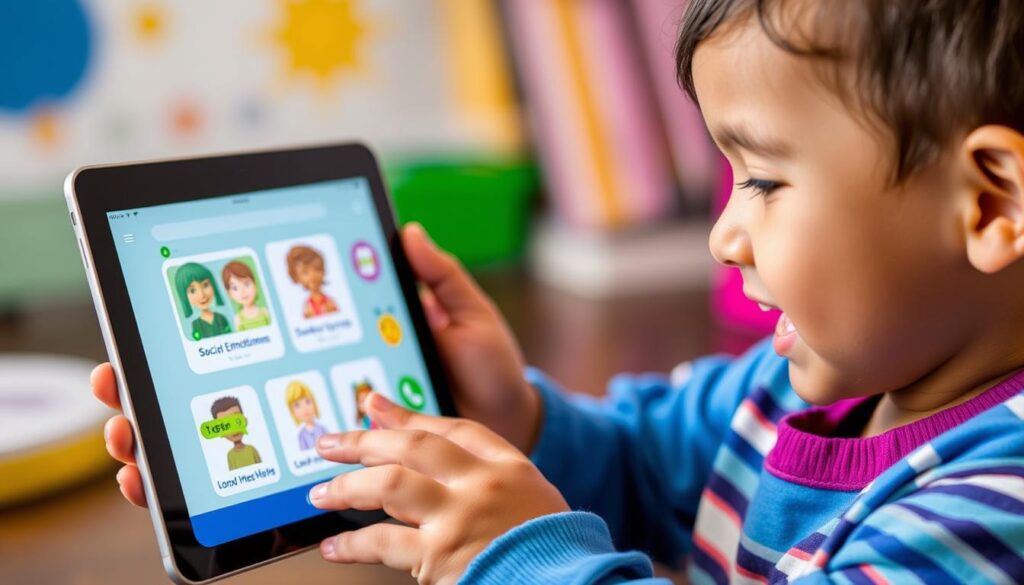
With the challenges posed by the pandemic, tools like Lunesia are more important than ever for fostering social-emotional growth in young children. The use of masks has affected communication fluency, raising concerns that align with the Critical Age hypothesis. This hypothesis suggests that the crucial age range for language learning is also essential for social-emotional growth.
Lunesia addresses this need with its comprehensive approach to developing social-emotional skills in preschoolers. By leveraging interactive and engaging methods, Lunesia helps children develop the skills they need to succeed.
Key Features of Lunesia for Preschoolers
Lunesia offers a range of features that make it an ideal tool for preschoolers. These include:
- Dynamic, interactive experiences that engage children’s attention and interest.
- Consistent, structured practice opportunities that many families struggle to implement on their own.
- A safe environment for children to practice social skills without pressure or anxiety.
- Immediate feedback and positive reinforcement through its digital format.
- A comprehensive approach that addresses multiple aspects of social-emotional development.
For more information on how Lunesia works, you can check out this Lunesia app review.
Research-Backed Approach to Emotional Development
Lunesia’s approach is grounded in research on social-emotional learning. By understanding how children develop emotional skills, Lunesia creates a tailored program that supports their growth. This research-backed approach ensures that children receive the most effective support for their social-emotional development.
Benefits Over Traditional Methods
Unlike traditional methods, such as static flashcards, Lunesia provides a dynamic and interactive experience. This approach not only captures children’s attention but also offers a more effective way to develop social-emotional skills. By leveraging Lunesia, families can give their children the resources they need to thrive.
Step-by-Step Guide to Using Lunesia with Your Child
As a parent, you’re about to embark on a transformative journey with Lunesia, helping your child develop crucial social-emotional skills. To get the most out of this innovative tool, follow these steps to create a supportive and engaging experience for your child.
Setting Up Your Lunesia Experience
To begin, setting up Lunesia is straightforward. Start by creating a profile for your child, which will allow Lunesia to tailor its activities to their age and developmental stage. This personalized approach ensures that your child is presented with challenges that are appropriate for their abilities, maximizing their progress over time.
Key steps include: downloading the app, creating a child profile, and familiarizing yourself with the interface. This initial setup is crucial for a smooth and effective experience.
Daily Activities and Routines
Consistency is key when using Lunesia. Incorporate Lunesia’s activities into your daily routine, such as during breakfast or before bedtime. This not only helps in developing a habit but also in reinforcing the skills your child is learning.
Here are some tips for daily routines:
- Spend at least 15 minutes a day on Lunesia activities.
- Use the app together with your child to enhance bonding and understanding.
- Discuss the activities and how they relate to real-life situations.
Tracking Your Child’s Progress
Lunesia offers a comprehensive progress tracking system that monitors your child’s development across five key social-emotional domains. Regularly reviewing the weekly progress reports will help you understand your child’s strengths, areas for growth, and suggested focus activities for the coming week.
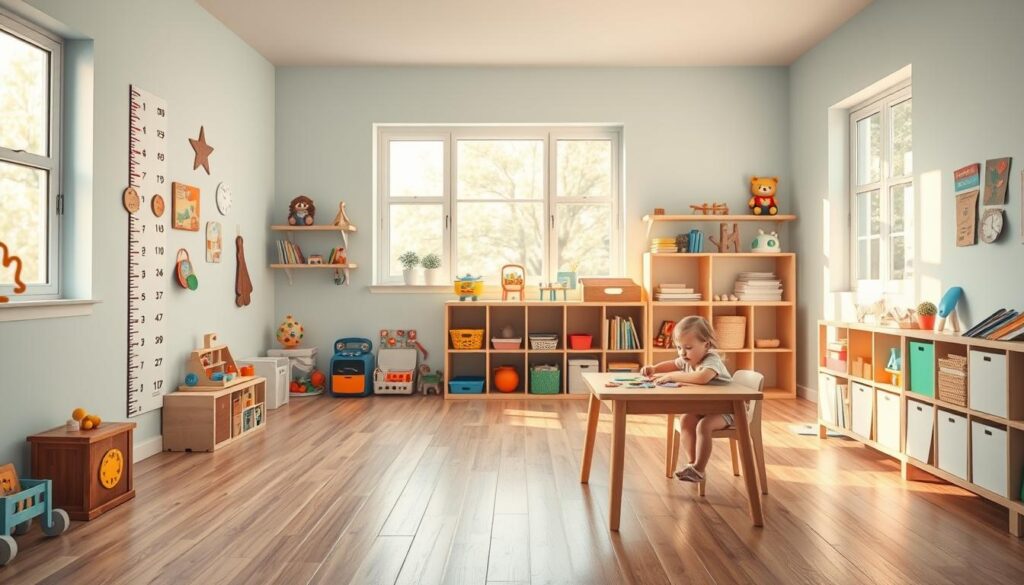
By paying attention to milestone achievements and using the parent observation tools, you can gain a deeper understanding of your child’s development. Participating in monthly assessment activities and sharing relevant progress information with other caregivers will further support your child’s social-emotional development.
As you navigate Lunesia with your child, remember that every child develops at their own pace. Celebrate their successes, no matter how small, and be patient with their progress. With Lunesia, you’re not just using an app; you’re investing in your child’s future.
Complementary Activities to Enhance Lunesia’s Impact
By combining Lunesia with other interactive experiences, you can create a rich environment for your child to develop essential life skills. Engaging in various activities with your child not only strengthens your bond but also provides opportunities for them to learn and grow in a fun and supportive way.
Using Puppets for Emotional Expression
Using puppets is a creative way to encourage children to express their emotions. By acting out different scenarios, children can learn to identify and manage their feelings in a healthy manner. This interactive approach can be both entertaining and educational for families.
Reading Stories That Reinforce Social Skills
Reading stories together is another effective method to reinforce social skills. Choose books that depict characters facing various social and emotional challenges, and use these stories as a springboard for discussions about empathy, cooperation, and problem-solving. This activity enhances children’s understanding of complex interactions within families and their broader social circles.
Collaborative Games and Activities
Engaging in collaborative games and activities is a great way to foster teamwork and cooperation among children. Introduce cooperative board games that require children to work together to achieve a common goal, rather than competing against each other. You can also create simple household challenges that necessitate teamwork, such as preparing a simple snack or organizing toys together. These activities help children develop patience, respect for others, and the ability to solve problems collaboratively, all within the comfort of their own house.
Some ideas to get you started include “emotion charades,” where children practice identifying and expressing different feelings, and scavenger hunts that require children to solve problems together. By incorporating these activities into your daily routine, you can create a well-rounded approach to developing your child’s social-emotional skills.
Conclusion: Long-Term Benefits of Developing Social-Emotional Skills with Lunesia
The social-emotional skills your child develops through Lunesia will have a profound impact on their life, from academic achievements to personal relationships. Research consistently shows that children with strong social-emotional abilities are more likely to succeed academically, form healthy relationships, and navigate life challenges effectively.
By investing time in your child’s social-emotional development now, you’re helping them build resilience and emotional intelligence that will serve them in all areas of life. As your child continues to develop these crucial skills, you’ll likely notice improvements in their confidence, communication abilities, and overall happiness.
The partnership between Lunesia, caregivers, and children creates a supportive ecosystem where social-emotional growth can flourish naturally over time. This collaborative approach ensures that the skills learned through Lunesia transfer beyond the digital environment into real-world interactions, benefiting your child’s future in profound ways.
FAQ
What are some ways to help my child recognize and understand emotions?
You can help your child recognize and understand emotions by using facial expressions, reading stories that show different feelings, and engaging in activities that encourage emotional expression, like using puppets. This can help your child identify and manage their emotions better.
How can I support my child’s emotional development at home?
To support your child’s emotional development at home, you can create a nurturing environment where your child feels safe expressing their feelings. You can also engage in daily activities and routines that promote emotional intelligence, such as sharing stories, playing collaborative games, and having open conversations about emotions.
What are some common milestones in a child’s emotional development?
Children typically reach certain milestones in their emotional development, such as recognizing and expressing their emotions, empathizing with others, and forming healthy relationships. You can track your child’s progress by observing their ability to manage their feelings, interact with others, and respond to different situations.
How can I use everyday interactions to teach my child about emotions and relationships?
You can use everyday interactions to teach your child about emotions and relationships by being mindful of your own emotional expressions and responses. By modeling healthy emotional regulation and empathy, you can show your child how to navigate complex feelings and build strong relationships.
What are some effective ways to help my child manage their feelings and behaviors?
To help your child manage their feelings and behaviors, you can teach them coping strategies, such as deep breathing, counting, or talking about their feelings. You can also encourage your child to express their emotions through creative activities, like drawing or role-playing, and provide positive reinforcement for good behavior.
How can I create a supportive environment that fosters my child’s emotional growth?
To create a supportive environment that fosters your child’s emotional growth, you can establish a daily routine that includes activities promoting emotional intelligence, such as reading, storytelling, and collaborative play. By providing a stable and loving environment, you can help your child feel secure and supported as they navigate their emotions.
